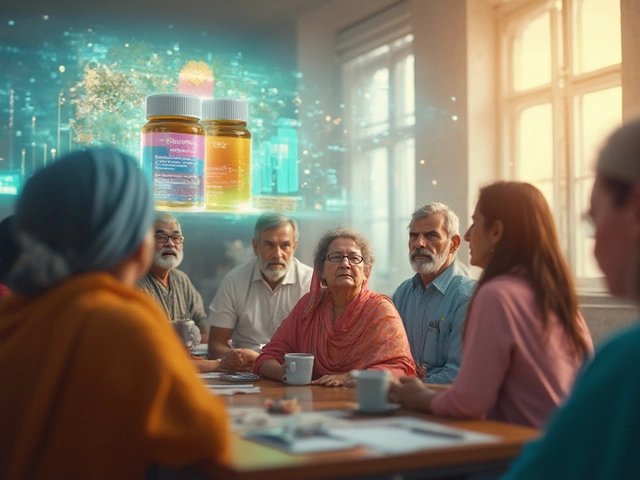Health Articles Archive – November 2024
When navigating Health Articles Archive, a date‑based collection of health‑focused stories. Also known as medical archive, it offers a quick way to find reliable information on pressing health topics. This month’s roster brings together four key health conversations. First, we look at Pancreatic Cancer, a silent killer that often goes unnoticed until it’s advanced. Early detection influences pancreatic cancer outcomes, so awareness of risk factors and symptoms matters. Next, we shine a light on Mental Health Disorders, conditions that many people overlook. Understanding these disorders improves overall well‑being and encourages timely help. The archive also covers cancers with higher survival rates, showing how early detection and modern treatments boost chances. Finally, we discuss heart surgery recovery, emphasizing that family support and practical coping strategies speed healing. All these pieces connect through a common thread: proactive health management.
Why This Collection Matters
Readers will find that health articles in this archive are more than just news—they’re practical guides. The pancreatic cancer piece explains why the disease is called a silent killer and lists lifestyle tweaks that may lower risk. The mental health article breaks down less‑talked‑about conditions, helping you spot signs before they spiral. The cancer survival overview highlights which cancers respond best to early screening and why those numbers keep improving. And the heart surgery guide gives spouses concrete steps to balance emotional support with daily chores, showing that recovery is a team effort. By linking early detection, awareness, and support, the archive demonstrates how each topic feeds into the others. When you understand one area, you’re better equipped to handle the rest.
Below, you’ll see the full list of November 2024 posts, each crafted to give you clear, actionable info. Dive in to learn more about these crucial health issues and see how they fit into a broader picture of staying healthy.

Understanding the Silent Killer: The Mystery of Pancreatic Cancer
Pancreatic cancer is often referred to as a 'silent killer' due to its ability to develop undetected until it reaches an advanced stage, making early detection crucial. This article explores why this type of cancer is particularly challenging to diagnose, outlines the risk factors, symptoms, and current treatment options, and emphasizes the importance of research in improving survival rates. Readers will gain an understanding of how lifestyle changes and awareness can play a role in prevention and early identification. The article serves as a guide to better comprehend the nuances of pancreatic cancer and efforts being made to combat this elusive disease.
read more
Uncovering the Most Overlooked Mental Health Disorders
Many mental illnesses fly under the radar, leaving sufferers feeling isolated and confused. Identifying these overlooked conditions is crucial to providing effective support and treatment. This article sheds light on some of the mental disorders that often go unnoticed and offers insight into their symptoms and impacts. By increasing awareness, we can take steps toward better mental health and well-being for all.
read more
Understanding Cancer Survival: The Most Manageable Types
Surviving cancer heavily depends on the type of cancer one faces. Certain cancers have higher survival rates due to advancements in treatment and early detection. This article delves into cancer types considered easiest to survive, providing insight into what contributes to these positive outcomes. It highlights practical advice and support options for those navigating a cancer journey to increase their chances of recovery.
read more
Supporting Your Husband: Coping After Heart Surgery
Living through a spouse's heart surgery is a daunting journey filled with emotional and physical challenges. Offering the right support requires understanding the recovery process and how to manage both practical concerns and emotional needs. This article explores effective strategies to help your husband heal, the importance of patience in recovery, and maintaining family dynamics during this time. With helpful insights and personal coping tips, it aims to guide spouses in maintaining their well-being while supporting their partner's recovery.
read moreAbout Us
Asoka Pharmaceuticals is a leader in the Indian pharmaceutical industry, dedicated to providing innovative and high-quality products for global healthcare. Our commitment to research, quality assurance, and meeting international standards ensures we remain at the forefront of healthcare solutions. With a vision to pioneer future advancements, we focus on delivering effective treatments that improve patient outcomes. Asoka Pharmaceuticals continues to extend its global reach, creating a healthier world.
read moreTerms of Service
The Terms of Service page for Asoka Pharmaceuticals details the legal guidelines for using the company’s website. It outlines user obligations, intellectual property rights, and limitations of liability to ensure compliance with relevant laws in India. All users must accept these terms unconditionally to access or use any part of the site.
read morePrivacy Policy
Asoka Pharmaceuticals is dedicated to protecting user privacy by adhering to India's data protection regulations. Our Privacy Policy outlines how we collect, use, share, and safeguard personal information. Learn about our commitment to transparency and secure data management practices.
read moreContact Us
Contact Asoka Pharmaceuticals for any inquiries related to our high-quality pharmaceutical products and services. Get in touch with the owner Rohan Talvani for further assistance. Explore our commitment to healthcare excellence and innovative solutions through our contact page. Reach out to us via email or fill out our contact form for quick responses. We're here to support your healthcare needs.
read more



